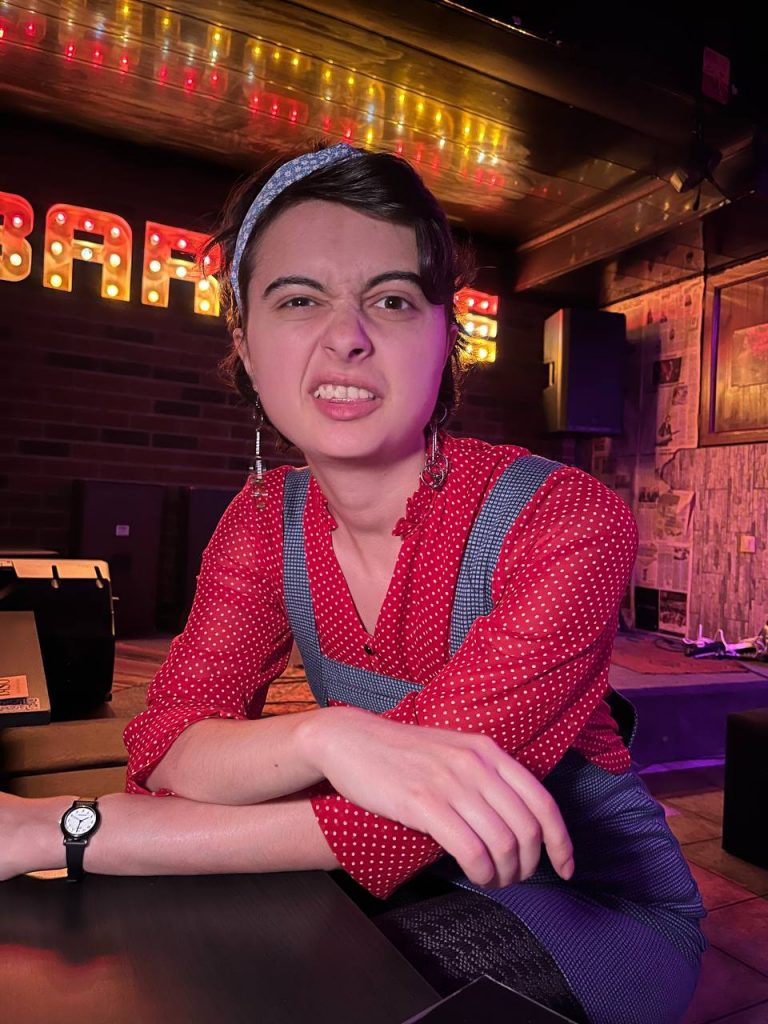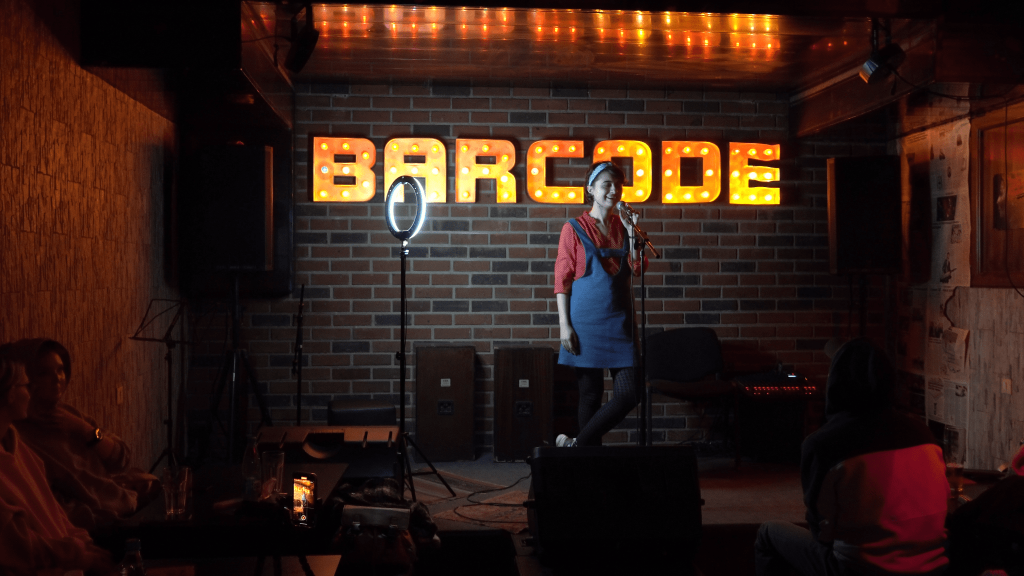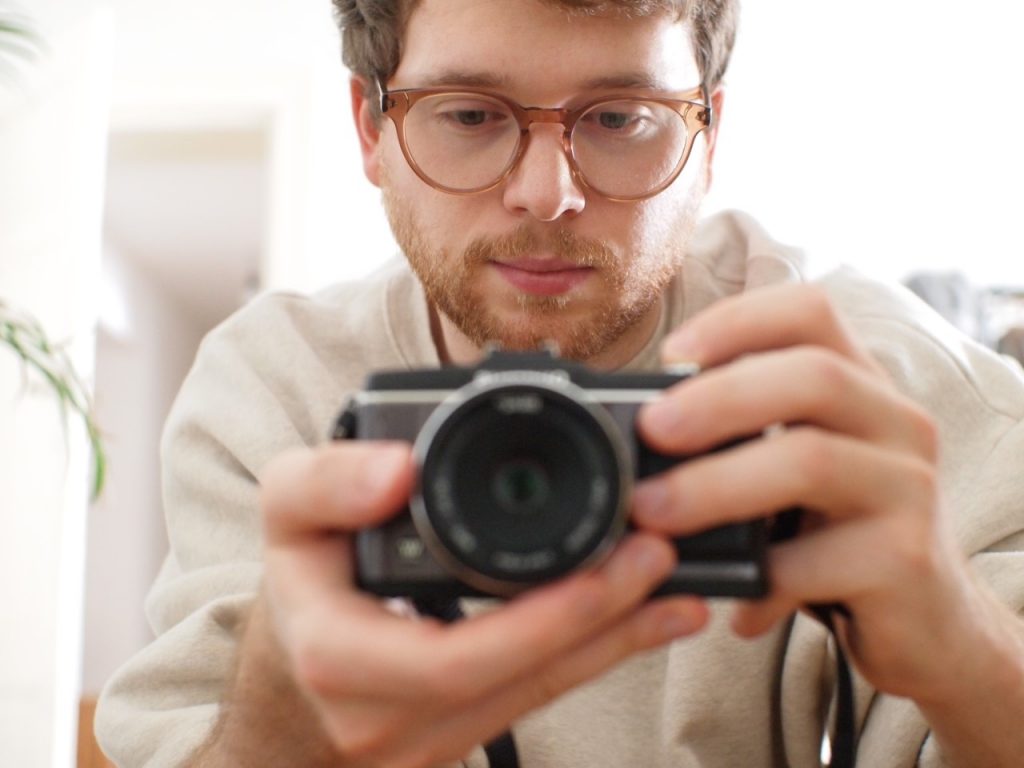by Henrik Schütz
In the center of Yerevan there is a pub called Barcode where a small group of Armenians meet regularly to present their latest stand-up material to each other. This Wednesday is an open mic night: anyone can perform, and Ani wants to try out some of her new jokes.

“We do open mics here once a week. And it’s a place where I feel home, where I can fail freely, and where I can be myself to try new stuff, which is what I’m going to do today.”
On this evening, everyone has a cigarette in their hand, electronic or analog, in the front there is a small stage with the name of the bar in illuminated letters. When Ani goes on stage to start her program, the audience is already in a good mood. The host of the evening, Leo Zatikyan, has performed well. There are not only Armenians, but also people from Russia, and someone from Ukraine. But not everyone is welcome. There is a sign hanging on the door with the crossed-out flags of Turkey and Azerbaijan and the words “нет”, “ոչ” “nein”, “no” in different languages.
The comedy scene in Armenia is actually not that different from those in the rest of the world, Ani says, with most comedians being male and making jokes about their wives – clichés about men and women work particularly well. With a program like that, you also make it onto Armenian television. But that’s not the stand-up Ani likes and wants to do. “I overthink all of that time. And when I can find a funny angle on what I’m overthinking about, I turn it into a joke.” That night her jokes reach about twenty people, and even there, many just laugh politely for now. She does her stand-up in Armenian, she has also done shows in Russian but that didn’t work well for her.
One of Ani’s jokes, on this evening, where especially the straight men in the audience remain silent is about her dating experience. “When I tell people I do yoga, men always expect me to be a sex goddess. And of course that’s true, yoga has taught me the best thing a woman can do in bed: It’s lying down for five minutes and pretending you’re not there.”
In the underground scene, comedians can still make dirty jokes; on television or on big stages, they would be censored. But for Ani, that has become a bit too easy, and her standards have also changed: “I don’t want to cross the line where I hurt someone, where I’m misunderstood.” This also has to do with the war. “I can’t joke about the war that’s been going on here. Because I have trauma related to it. And all of my friends do, and most of the audience does. And even if I make it funny, I’m not sure I want to trigger that trauma.”
In September 2020, Armenia’s neighbor Azerbaijan attacked. At stake is the Armenian-controlled region of Nagorno-Karabakh; the two countries are at odds over who should control it. In the war that lasted 44 days,

Azerbaijan was able to win militarily, and a ceasefire agreement, brokered by Russia, came into effect in November 2020. Nevertheless, fighting continued between the two countries, most recently in September 2022. Armenia has a population of about 3 million, and Ani believes that everyone knows at least someone who died or was injured in the war.
She also lost someone, her best friend: “Of course, I was depressed after the war. And, you know, they say that stand-up and humor in general are therapeutic. It’s like therapy, but others claim that it is the opposite of therapy. It’s like a painkiller you take instead of deep healing.”
During the 44-day war there were no stand-up shows, and it wasn’t until months after the fighting ended in 2020 that Ani made her first appearance. “We did our first shows with an audience of over 100 people, which gave us really positive feedback. We started at the spot where everyone needed some healing, something to laugh about after those super tense months.”
In the embattled regions of Armenia, where war defines part of everyday life, jokes about it are also part of daily experience. “We have a couple of guys who have been at war. And they are the ones who make the best jokes about it.” Ani tells of a comedian who worked as a translator for foreign war reporters. “The way he tells how people near the frontline used to talk about it is how they used to joke during the war. And he told it in a hilarious manner: that was one of the best parts of the postwar stand-up scene.”
The fact that even the people who suffered the most from the war can continue to make jokes also reassured Ani in doing comedy again. “At the first shows, I had a lot of guilt for the families that were affected the most.” But the stand-up evenings are also attended by many who have lost a lot in the war. Comedy gives people the opportunity, for an evening or just a brief moment, to make the horrors of war a little bit easier to bear. “I realized that this is what we all need.”
After her performance, Ani sits back in the audience, relieved. She feels great even though, “it had its awkward minutes since the audience was part Russian speakers and part Armenian, so not everyone was in at every moment of it.” But still: it was nice for Ani to be on stage, she loves her stand-up community and telling what’s on her mind. Next Wednesday there is a new show.
This article was published within the frames of “Correspondents in Conflict” Project,
implemented by Yerevan Press Club and Deutsche Gesellschaft e. V. The Project is
funded by the German Federal Foreign Office within the “Eastern Partnership Program”.
The contents of this article are the sole responsibility of the implementing partners and can in
no way be taken to reflect the views of the Federal Foreign Office. #civilsocietycooperation
 Henrik Schütz works as a video and radio journalist mainly for WDR COSMO and Deutschlandfunk. From October to November 2022, Henrik Schütz was an IJP fellow at the Georgian cultural magazine Electronauts, which focuses on Georgian music and culture. He has already made several trips to former Soviet countries and has always had a focus on how Russia still has an influence on the cultural scenes in those countries.
Henrik Schütz works as a video and radio journalist mainly for WDR COSMO and Deutschlandfunk. From October to November 2022, Henrik Schütz was an IJP fellow at the Georgian cultural magazine Electronauts, which focuses on Georgian music and culture. He has already made several trips to former Soviet countries and has always had a focus on how Russia still has an influence on the cultural scenes in those countries.












